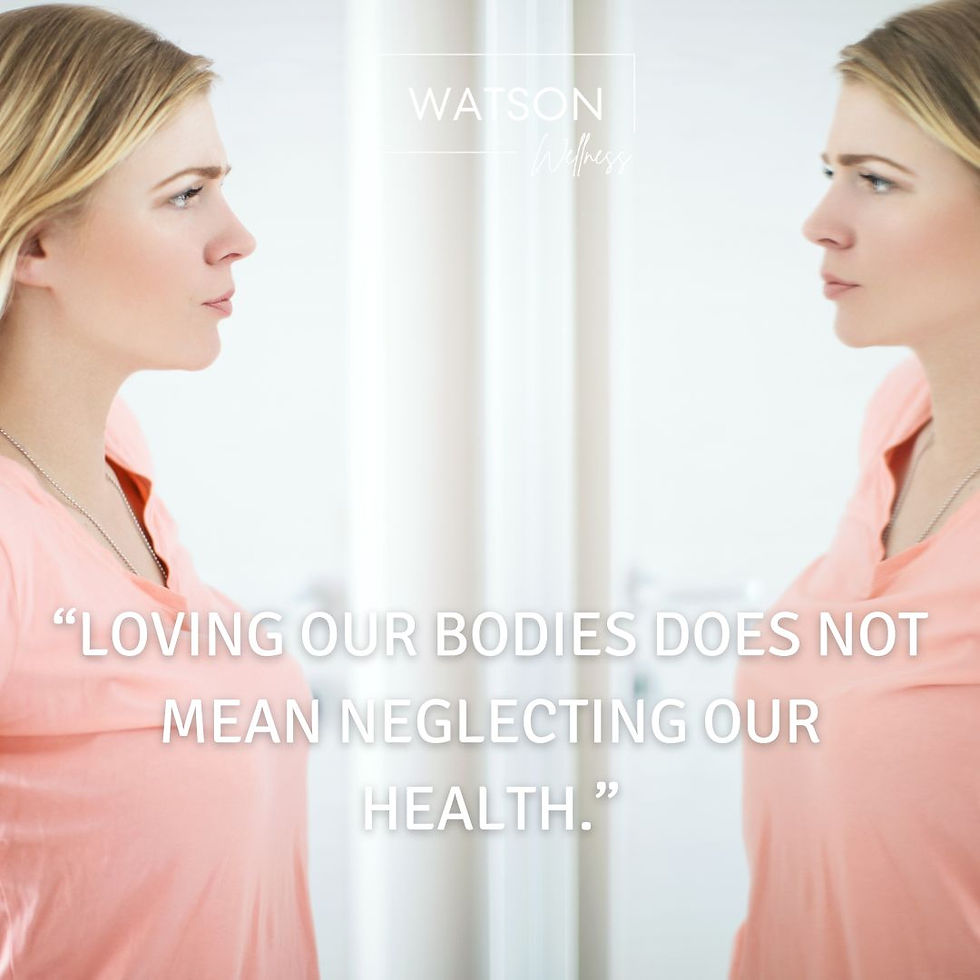Embracing a Healthy Body Image: "Loving our bodies does not mean neglecting our health. "
- watson2wellness
- Jan 29, 2024
- 4 min read
Body image, particularly among women, is a multifaceted issue influenced by a plethora of factors, from childhood experiences to societal pressures. Despite this, I firmly believe that cultivating a positive, truthful, and kind self-image is not only possible but crucial for our mental and physical well-being.

The body positivity movement is a social movement that advocates for the acceptance and celebration of all body types, regardless of size, shape, or appearance. It emerged as a response to the pervasive societal beauty standards that promote a narrow and often unattainable ideal of beauty, typically characterized by thinness, youthfulness, and symmetry.
At its core, the body positivity movement seeks to challenge these unrealistic standards and promote inclusivity, self-love, and acceptance of diverse bodies. It emphasizes the idea that all bodies are valuable and worthy of respect, regardless of whether they conform to mainstream beauty norms.
Key principles of the body positivity movement include:
Self-Acceptance: Encouraging individuals to embrace their bodies as they are, without feeling the need to conform to external ideals or standards.
Celebration of Diversity: Recognizing and celebrating the diversity of human bodies, including differences in size, shape, ability, race, gender identity, and more.
Rejecting Body Shaming: Condemning all forms of body shaming, whether it be fat-shaming, skinny-shaming, or any other type of discrimination based on appearance.
Promoting Health at Every Size: Emphasizing that health is not determined by body size alone and advocating for a holistic approach to well-being that prioritizes physical, mental, and emotional health over weight or appearance.
Challenging Beauty Standards: Critiquing and challenging societal beauty standards that prioritize a narrow range of body types and perpetuate harmful stereotypes and discrimination.
The body positivity movement has gained significant traction in recent years, thanks in part to social media platforms where individuals can share their stories, experiences, and images that promote body acceptance and diversity.
It's important to recognize that while the body positivity movement has many valuable aspects, there are also considerations that require caution and clarity. Here's a breakdown of some key points to consider:
1. Separating Value from Body Size
Positive Aspect: The movement challenges the notion that thinness or youthfulness equates to worth or beauty, promoting the idea that all bodies are inherently valuable regardless of size or appearance. You have value as a human, not because of the size or shape of your body.
2. Avoiding Shame
Caution: While it's crucial to avoid feeling shame about our bodies, we also have a responsibility to care for them. This means acknowledging that our lifestyle choices can impact our health and well-being.
3. Responsibility for Health
Positive Aspect: Emphasizing that we have one body and a responsibility to care for it, which includes making wise choices that promote our health and well-being.
Caution: Acknowledging that certain lifestyle choices, such as nutrition, exercise, and rest, directly impact our health and weight. Ignoring these factors can have adverse effects on our overall well-being.
4. Pursuing Health
Positive Aspect: Recognizing that loving our bodies does not mean neglecting our health. It's possible to embrace body positivity while still prioritizing healthy habits that support overall well-being.
Caution: Avoiding extremes, such as mistreating our bodies by depriving them of essential nutrients or overexerting ourselves in pursuit of a certain body size or shape.
5. Listening to Medical Advice
Positive Aspect: Acknowledging the expertise of healthcare professionals and being open to their recommendations regarding our health habits.
Caution: While it's important to consider medical advice, it's also essential to advocate for ourselves and ensure that recommendations align with our individual needs and values.

In summary, while embracing body positivity is crucial for cultivating a healthy self-image, it's equally important to recognize our responsibility for caring for our bodies and prioritizing our health. This involves striking a balance between self-acceptance and self-care, acknowledging that both are essential components of overall well-being.
Tips for Changing Your Self-Image:
Understand the Roots:
Reflect on childhood experiences that may have influenced your self-perception.
Recognize the impact of societal standards on shaping your body image.
Understand how comments and comparisons from the past may still affect you today.
Challenge the Status Quo:
Declare your body a "no hate zone" and foster self-acceptance and compassion.
Critically analyze media messages and reject unrealistic beauty standards.
Seek out diverse representations of beauty to counteract harmful influences.
Option: turn it off, unfollow, block.
Shift the Focus:
Celebrate the capabilities and strengths of your body beyond appearance.
Focus on what your body can do rather than how it looks.
Find gratitude and strength in your body's abilities and experiences.
Have you endured sickness or medical challenges?
Have you given birth?
Have you cared for other human beings ( children, friends, spouse, parents)?
Look and acknowledge what your body has done.
Change the Dialogue:
Be mindful of the language you use when talking about yourself and others.
Replace negative self-talk with affirming and appreciative language.
Acknowledge and celebrate your body's inherent worth and beauty. You are more than just a body. You matter.
Cultivate Sustainable Habits:
Prioritize health over external outcomes like weight loss or appearance.
Focus on developing sustainable habits and routines that support your well-being.
Make choices rooted in self-care and nourishment rather than succumbing to societal pressures or quick fixes.
Embarking on the journey to change your self-image may be challenging, but it's a worthwhile endeavor. By understanding your roots, challenging societal norms, shifting your focus, changing the dialogue, and cultivating sustainable habits, you can foster a truthful, confident, and positive self-image that celebrates your inherent beauty and worth.




Comments